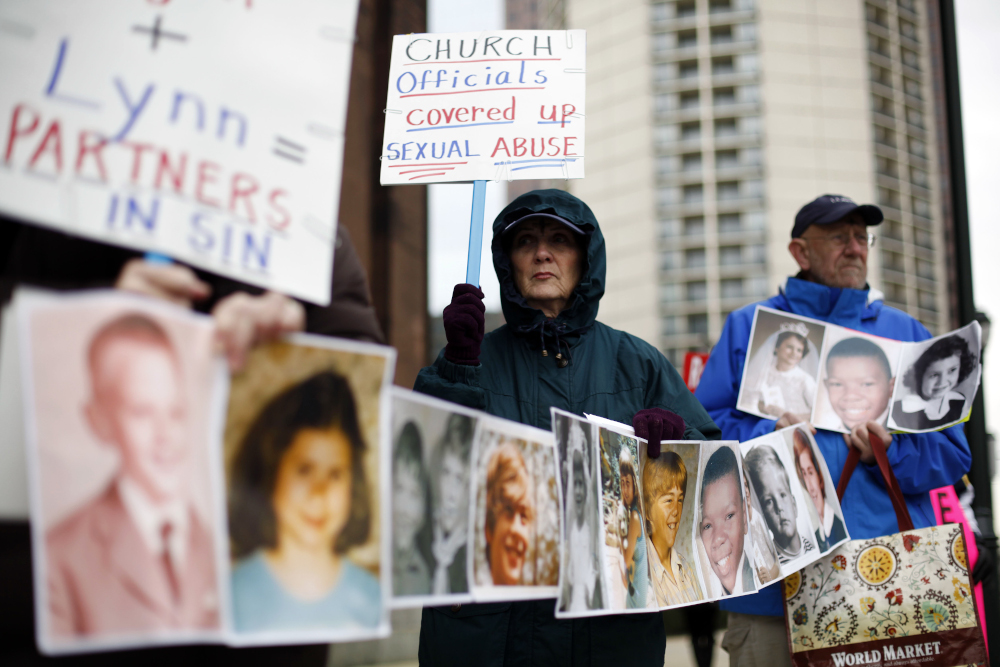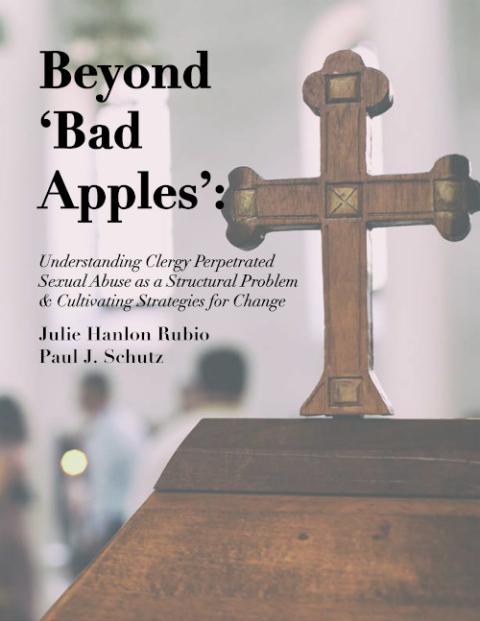
Catherine Coleman Murphy, center, and Jack Wintermyer, right, protest along with others outside Cathedral Basilica of Sts. Peter and Paul before an Ash Wednesday Mass in Philadelphia on March 9, 2011. (AP/Matt Rourke)
A new report based on interviews with some 300 Catholic priests, nuns and laypeople concludes that clergy aren't adequately prepared to wield the power they exercise and need more education on questions of sex and gender.
The report, "Beyond Bad Apples: Understanding Clericalism as a Structural Problem & Cultivating Strategies for Change," released Aug. 15, explores the links between clericalism — clergy's focus on its authority — and clergy-perpetrated sexual abuse.
The study's authors, Julie Hanlon Rubio and Paul J. Schutz, both professors at Santa Clara University, a Jesuit institution in Northern California, initially intended to survey 600 respondents, drawn proportionally from lay, religious (those who take vows but are not ordained to the priesthood) and priests, but were turned away by five of the six dioceses and diocesan seminaries they approached.
The authors admit that this "likely means that our respondents are biased towards agreement with our theory of clericalism" and that "our data leans in one direction."
Advertisement
Nearly half (48.4%) of the 300 who participated were lay Catholics, 22% were nuns, 16% were priests and 6% were men in formation for the priesthood. More than two-thirds of their responses from priests came from those educated in Jesuit institutions.
The report was funded by a grant from Fordham University as part of a project dubbed, "Taking Responsibility: Jesuit Educational Institutions Confront the Causes and Legacy of Sexual Abuse."
Rubio and Schutz wanted to move away from asking, "Is he a good priest or a bad priest?" and ask instead, "What are the underlying reasons that this priest is acting in this way?"
Existing studies, said the authors, "have focused on individuals who engage in abuse due to personal weakness, psychosexual vulnerabilities, the influence of broader historical movements, or poor theology and training."
Schutz told Religion News Service that their aim was to understand how "structural clericalism operates in the church," comparing clericalism to the way structural racism shapes the lives of people of color.
Rubio said, "When you blame 'bad apples,' then everybody else is sort of innocent, as long as we go after the bad apples. But when you say there's a problem with the structure, that's a much bigger problem, and we're all implicated."

"Beyond Bad Apples: Understanding Clericalism as a Structural Problem & Cultivating Strategies for Change (RNS/Courtesy photo)
The authors said their data shows that sex, gender and power are all components of structural clericalism, which in turn keeps priests above and apart from the rest of the church and potentially enables abuse.
Nearly half (49%) of priest respondents and 73% of those in formation said that they were told repression or sublimation were strategies for dealing with their sexuality (how one lives as a sexual person), according to the report. This number increases to 83% among non-Jesuit-educated priests.
The report also noted that 70% of those in formation and 51% of priests said it was difficult to talk about their sexuality. More than 75% of all respondents said the church would be a healthier institution if priests spoke openly about their own sexuality.
Half of priests and those in formation said their formation program gave them the tools they needed for living a celibate life without denying their sexuality. Of this 50%, all were Jesuit-educated; none were diocesan priests or students in diocesan seminaries.
Large majorities in the study rejected "simple correlations between homosexuality or celibacy and (clergy perpetrated sex abuse)." Only 11 respondents named homosexuality and only four named celibacy as a factor in clergy-perpetrated sex abuse, according to the report.
Among the survey's participants, 40% of priests and men in formation for priesthood identified as homosexual or bisexual, the report found. Officially, the priesthood is limited to heterosexual men.
"The concentration of gay men in the priesthood cannot be overlooked because most priests are not able to be open about their sexual orientation, and some may consciously or unconsciously seek out priesthood as a way of avoiding or repressing their sexuality, making healthy celibacy extraordinarily difficult," the report read.
Among the survey's participants, 40% of priests and men in formation for priesthood identified as homosexual or bisexual, the report found.
When pertaining to gender, fewer than half (48%) of participants in the study named patriarchy as a significant factor in clergy sex abuse. "Very few" participants discussed the role of gender when asked about the relationship among gender, sexuality and sexual abuse in the church, according to the report.
Just over 50% of Jesuit-educated respondents and about 40% of non-Jesuit-educated respondents said that men and women participated equally in their academic classes and were shown equal respect. About two-thirds at Jesuit schools and a little fewer than 50% at non-Jesuit schools reported equal respect for female professors.
Fewer than 30% said they had encountered gender or sexuality studies in an academic setting.
Clericalism was identified as a looming problem in the report. Clergy, lay and religious participants discussed "various versions of authoritarian management, all of which are linked by an excessive exercise of positional power."
Others described numerous "disorganized" management styles, with one lay respondent describing her priest's management style as "benign neglect tending toward chaos and toxicity."
Lay people and religious see their priests differently than the priests in the report see themselves. When asked if they welcome constructive criticism about preaching, 80% of priests and 87% of deacons said they did. However, only 9% of the laypeople and the nuns in the report agreed that clergy are receptive to criticism, while 52% disagreed.
"Lay people are conditioned by structural clericalism to believe that they can't ask the question, they can't approach the father with their concern about the homily, or they can't bring this administrative or budgetary concern before the priest because, you know, he's in charge," Schutz said. "We've all been conditioned over the course of our lives to see the priest in that way."
On analogy with anti-racism, anti-clericalism is a moral stance that can be embraced by anyone with critical awareness of a structural problem.
Thomas G. Plante, a professor of psychology and religious studies at Santa Clara University, described the report as an "ambitious project," but said that, given the limitations of the people who participated, it's important "not to over generalize."
Data shows that allegations of clerical sex abuse of minors have declined, while "clericalism hasn't changed as much in the 21st century," said Plante, who provided early consultation for the study.
Sex abuse of children and teens, he said, is a "common phenomenon regardless of where men are working."
"When we look at anyone who has power and control … whether they be clerics, school teachers or tutors, you're going to find a fair amount of child sex abuse," he said. "We have to work hard to minimize that."
Rubio and Schutz hope the report will "contribute to a healthier future for our Church," they wrote.
They take what they call an "anti-clericalism" stance — not anti-priest. "On analogy with anti-racism, anti-clericalism is a moral stance that can be embraced by anyone with critical awareness of a structural problem," their report said.
Among their recommendations, the authors said the church should provide spaces for open discussions of sex and sexuality. Including women in seminary classrooms and on seminary faculties and the study of feminist perspectives on the Catholic faith may also be "necessary to disrupt environments of male dominance and the perpetuation of male power."
Lay people and religious should also be able to contribute their experience to church life. "Leveling the playing field in ecclesial life," the report said, "is a part of constructing safer environments where sexual abuse will be less likely to occur."






